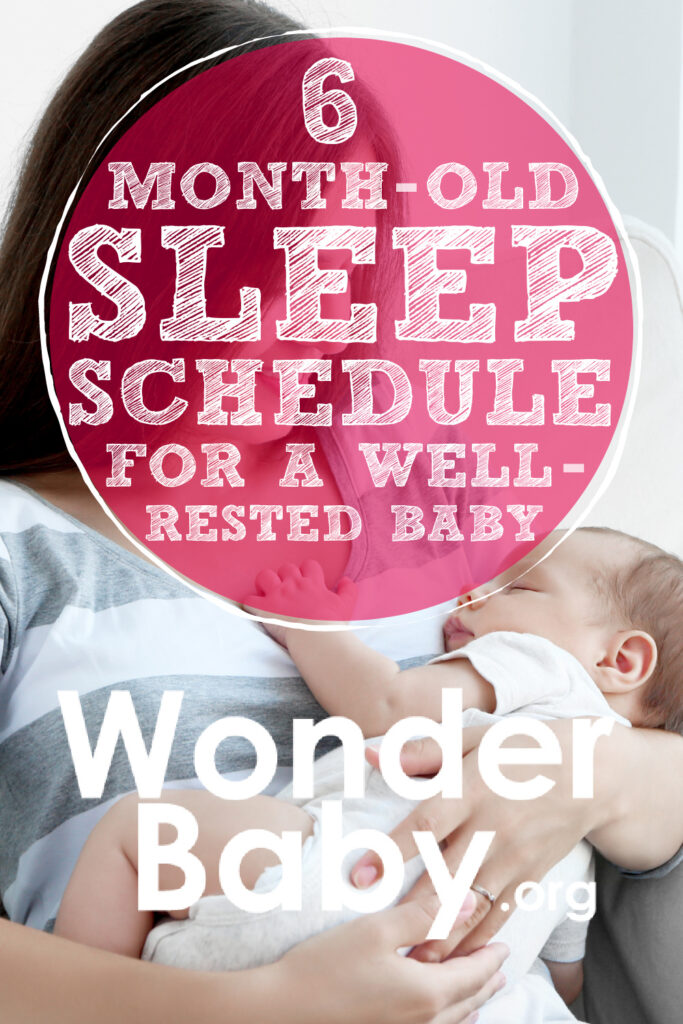A 6-Month-Old Sleep Schedule for a Well-Rested Baby

- At 6 months old, your baby has reached a stage in their development where they can sleep independently and link sleep cycles with you.
- Keeping your baby on a consistent sleep schedule will make them fall asleep faster, stay asleep longer, and get better quality rest.
- Six-month-olds need around 14 hours of sleep per day, about 11–12 hours at nighttime, and 2.5–3.5 hours for naps.
- Most babies require at least 2–3 hours of awake time in between sleep periods.
- You can start teaching your baby to fall asleep on his own at around 4 months old by laying him down when he’s tired but not yet sleeping.
When my daughter was born, I didn’t sleep for four days straight. Perhaps, like me, you can relate to being a nervous new parent and afraid to take your eyes off of your child.
As relatable as this, good sleep is vital for your health and your baby’s as well. Sleep deprivation in mothers of infants is a significant cause of mood changes that can lead to postpartum depression.
Keeping your baby on a solid 6 month old sleep schedule will help him fall asleep faster, stay asleep, and get better quality rest! This will help improve his mood during waking hours—great news for you and your baby.
6-Month-Old Sleep Schedule: What Parents Should Know
A 6-month-old infant needs around 14 hours of sleep per day. Generally, this breaks down into about 11 hours of nighttime sleep and 2.5–3.5 hours of daytime sleep.
Premature babies often use an adjusted age scale to determine their specific sleep requirements.
Another important note—the timing of your baby’s sleep is important! Most babies require at least 2–3 hours of awake time (called wake windows) in between sleep periods. This is especially important in between the third nap and bedtime.
This makes sticking to a schedule extremely beneficial. Getting a little behind can make squeezing in a third nap tricky and can interrupt his bedtime routine.
It can be tempting to skip it, but you may want to strongly encourage your baby to take that last nap. The payoff is that he won’t be overly tired and irritable at bedtime. You may need to try sleep training for naps.
How many hours of sleep per day does a 6-month-old need?
According to the Sleep Foundation, infants from 4-11 months old require 12–15 hours of sleep daily.
How much nap time does a 6-month-old need?
The first two naps of the day usually average between 60–90 minutes long. The last nap of the day should be shorter, about 30–45 minutes.

Why Is It Important for a 6-Month-Old Baby to Have a Sleep Schedule?
Establishing this sleep cycle in your baby as a newborn is a tremendous benefit to your child and yourself! By 6 months, most babies have developed their sleep-wake cycle based on their circadian rhythm.
The sooner you begin sleep training your baby through a consistent schedule, the quicker they will learn to sleep through the night.
What to Consider When Making a Sleep Schedule for a 6-Month-Old Baby?
When making a sleep schedule for your 6 month old, you’ll need to make sure they’re getting enough nighttime sleep and daytime sleep. Consider your family’s daily routines, work schedules, and meal times as well.
How many naps should a 6-month-old baby have during the day?
At 6 months old, most babies still need 3 naps per day. If you struggle to get your baby to sleep for the last nap of the day, consider extending his wake window by 15 minutes. It’s okay if bedtime gets pushed back a bit if the result is a happier, less-stressed baby.
How to Create a Sleep Schedule for Your 6-Month-Old Baby
By 6-months-old, your baby’s development has reached the stage where he’s ready to sleep on his own and link sleep cycles. How do you create your baby’s sleep schedule to coexist with your family’s and stay consistent?
If you’ve been rocking or feeding your baby to sleep and it’s cutting into your sleep or evening routine, it’s perfectly safe and healthy to let your baby fall asleep with less help.
To get started, you can practice putting your baby to sleep when he’s tired but not asleep yet (also called fading sleep training). This can be done little by little.
6-Month-Old Sleep Schedule
The following sleep schedule is meant as a guide to see how the breakdown of naps and wake windows will work on a daily basis. You can adjust it as it suits your family’s needs.
| Wake up | 6:30 AM |
| 1st nap (2 hours after wakeup) | 8:30–9:45 AM (1.25 hours) |
| 2nd nap (2.25 hours after nap 1) | 12–1:30 PM (1.5 hours) |
| 3rd nap (2.5 hours after nap 2) | 4–4:30 PM (30 mins) |
| Bedtime (3 hours after nap 3) | 7:30 PM |
This sample sleep schedule meets the criteria of 11 hours of nighttime sleep, plus around 3.25 hours of nap time, for a total of 14.25 hours as the goal.

What Time Should a 6-Month-Old Sleep at Night?
Ideally, babies thrive when they fall asleep between 7–7:30 PM and wake up around 6:30 AM. Many babies will start to resist the third final nap of the day around this age.
Don’t be fooled into thinking it’s time for a nap transition to only two naps daily. Research indicates that most babies aren’t ready to cut out their final nap until around 7–9 months old.
When a baby transitions away from naps too early, it can lead to additional sleep issues (such as night waking). If your baby is going back and forth between two or three naps a day, increase his wake windows (just 15 minutes at a time), to increase his drowsiness. Also, incorporate lots of brain games and active play.
What Time Should a 6-Month-Old Have Their Naps?
At 6 months, most babies’ nap schedule include three naps daily with 2–3 hours of awake time in between. This can sound tricky to plan—refer to the table above schedule if you need help.
Wake windows should increase throughout the day, so the longest awake time is the final period after the afternoon nap and before bedtime.
Many babies will fall asleep for their morning nap just 2 hours after waking and take around 3 hours between their afternoon nap and bedtime routine. It might take some time and research to decide on a sleep plan that works best for you and your family.
Helpful Tips to Get Your 6-Month-Old Baby to Sleep and Nap on Schedule
All babies experience sleep training struggles from time to time, but there are tips you can keep handy to help when your baby’s fighting sleep and to give you more peace in your evenings.
Environment
Make sure your baby sleeps in a dark, calm, quiet space, free from distractions.
Keep Your Baby Awake
This might seem counterintuitive but rocking him all the way to sleep and then putting him down is not only time-consuming, but often this wakes him as you set him down.
Instead, try swaddling, snuggling, and massaging your baby as part of his bedtime routine. You’re signaling that it’s time to rest and trusting your baby to learn to self-soothe and sleep on his own—which is exactly what a 6-month-old baby is developmentally prepared to do!
Schedule
Consistency is key. Your baby will fall asleep faster and get the best quality sleep when you keep your baby’s wake windows and sleep schedule at the same time and roughly the same duration each day. Disruptions are inevitable but try to get back on track. You’ll be glad you stuck to the schedule!
It will take your little one a while to adjust to this new way from his old sleep schedule, so you might want to put him down about 10 minutes earlier when you start. This allows your baby to get accustomed to the new routine and avoid any overly tired fussiness.
Why does my baby move so much during sleep?
Babies are often active during sleep. Often, you can see them moving their arms and legs or even making facial expressions. It can be easy to mistake these stirrings as a signal that your baby is waking up or not getting good sleep.
This is not always the case. Wait a few minutes before intervening to give your little one a chance to settle down and fall back asleep on his own.
Getting your baby on a good, consistent sleep schedule can be challenging! Don’t fret if some days are really hard. They won’t all be. Remember to stick to the schedule and be patient, don’t make bedtime feel like a punishment for you or your baby.
If you’re struggling or have concerns about your child’s sleep, talk to their pediatrician about it as soon as possible to find solutions and set your mind at ease.

At What Age Do Babies’ Sleep Regress?
Sleep regressions occur at any age during infancy and toddlerhood—most often at 4 months, 6 months, 8 months, 12 months, 18 months, and 2 years.
Your baby’s sleep habits can be tricky to manage, but typically a sleep regression lasts less than a month, and your baby will find his rhythm again, so don’t get discouraged!
FAQs
How can you get a 6-month-old baby to sleep through the night?
Many babies can learn to sleep through the night at 6 months old.
If your baby is used to falling asleep independently, gets all their hydration and nutritional needs met and is active during the day, they’re more inclined to sleep through the night.
Conversely, if your baby has a parent-led sleep association or gets hungry during the night, they are likely to wake up. It’s common for babies at this age to still have up to 1–2 night feedings at this age, also.
Is it okay to start sleep training a 6-month-old baby?
Pediatricians and experts recommend implementing sleep training methods when your baby is between 4–6 months old.
This age is the sweet spot where babies are old enough to physically go 6–8 hours without eating but aren’t quite at the point where the comfort you provide has become a sleep association they rely on.
If you want your 6-month-old sleep schedule to be consistent so you can sleep through the night and avoid your baby not sleeping in his crib, teach him to fall asleep independently at an early age!
If you need more help, ask your baby’s doctor to refer you to a certified pediatric sleep consultant or provide other resources. And don’t get discouraged! Your baby, and you, will be resting peacefully in no time.

Related Posts

Sleep, Special Needs
Safe Place Bedding Travel Bed Review
Traveling with a special needs child can be stressful! Having a safe, durable, and easy to use travel bed can make traveling so much easier!

Sleep, Special Needs
Sleep Regimen for Premature Babies: Special Considerations
It can take premature babies much longer than their full-term peers to sleep for long stretches. A preemie sleep schedule may encourage better sleep.

Sleep
Mastering the Bedtime Routine: 3 Tips for a Peaceful Night’s Sleep
From around six weeks, a newborn bedtime routine can help your baby learn the difference between day and night and prepare for a restful night’s sleep.